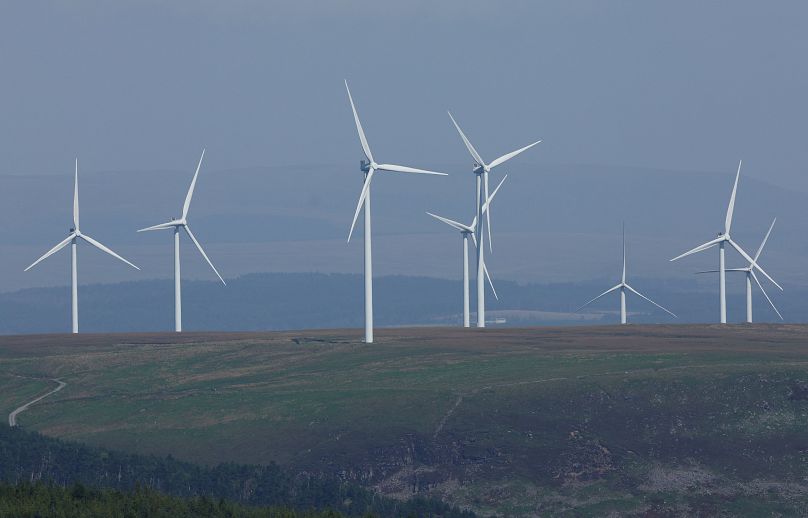Though it may be small, Wales is one country making moves on climate action.
Extreme weather, storms and flooding continue to emphasise the unavoidable importance of climate action in Europe and beyond.
 ADVERTISEMENT
ADVERTISEMENT
 ADVERTISEMENT
ADVERTISEMENT
The need to decarbonise our energy systems by quitting fossil fuels and committing to clean power has never been more clear.
Each country has its unique challenges and resources that influence its road to net zero. But celebrating one another’s successes can help inspire and pressure our own politicians to follow suit.
Though it may be small, Wales is one country making moves on climate action.
Wales is challenging Westminster on net-zero
The UK government recently backpedalled on a number of net-zero commitments including delaying a ban on petrol and diesel cars.
Wales’ climate minister teamed up with the Scottish National Party (SNP)’s Net Zero Secretary to call for a summit to keep net-zero pledges on track.
In a letter, they pointed out their “disappointment” in the Prime Minister’s announcements last month, saying that the devolved governments of Wales, Scotland and Northern Ireland hadn’t been consulted.
The two ministers demanded a “new, mutually respectful partnership” and a summit of the four nations chaired by the independent Climate Change Committee to ensure net zero commitments remain on track.
So what is Wales doing to keep net-zero targets within reach?
From coal to community-owned renewable energy
Like the rest of the UK, Wales has a legally binding target to reach net-zero emissions by 2050. The country’s last coal-fired power station closed in 2019 but, though it may have stopped using coal for its power, mining in Wales has a complex history dating back hundreds of years.
Ffoys-y-Fran, the UK’s largest opencast coal mine located in Merthyr Tydfil, is finally due to close in November this year. The mine’s appeal to continue extracting coal was turned down by the local council on climate grounds.
Local residents also took part in a long-running campaign calling for the mine to shut down, highlighting the impact it was having on their health and happiness. Some homes were less than 40 metres away from Ffoys-y-Fran.
Policies are also in place to stop new coal mines and extensions to existing ones in the future. They failed to prevent a bid to reopen an opencast coal mine in Carmarthenshire earlier this year.
Ultimately the application was turned down due to local ecological impacts. But it sparked a call from more than 30 Welsh NGOs and businesses for the government to finally ban coal mining on Welsh soil.
Wales intends to meet 100 per cent of its electricity needs from renewables by 2035. And it has some interesting methods of upping its clean energy capacity.
A new publicly-funded energy company, Ynni Cymru, was launched earlier this year. It has been created in an attempt to expand community-owned renewable energy projects across Wales.
This includes handing out grants for projects to install solar panels on community buildings and businesses as well as zero-emissions community heating that could also bring bills down for residents.
Climate Change Minister Julie James said that the launch puts the country on a pathway to meet its renewable energy goals.
“The current market-based approach to the energy system is not delivering decarbonisation at the scale or pace necessary for the climate emergency and has not been retaining sufficient benefit in Wales,” she said earlier this year.
“Local use of locally generated energy is an effective way to support net-zero and keep the benefit in our communities.”
What else is Wales doing for climate change?
Parts of Wales were severely flooded by Storm Babet this month as the country contends with the growing impacts of climate change. But the government has just committed £4.6 million (€5.2 million) of funding to protect thousands of properties using nature-based solutions.
Peatlands, also known as bogs, mires or moors, can have a significant impact on climate change - but only if managed properly. They have the potential to be important carbon sinks but 90 per cent of Wales’s peatland has been damaged to the extent that it emits greenhouse gases.
The Welsh government is offering peatland owners funding to help restore these unique ecosystems. The grants are seen as a critical component of the country’s efforts to triple the rate at which its peatlands are being restored and help protect against the effects of the climate crisis.
Wales also cancelled several major road-building projects earlier this year on environmental grounds. A “groundbreaking” policy reassessed more than 50 schemes against a series of tough tests on their climate impact.
Dozens of major projects were halted or amended based on this review with officials considering whether new roads are really the solution to the country’s transport problems. The government has said it provides an opportunity to instead invest in public transport, cycling and walking schemes.
A number of single-use plastic items including plates, cutlery and polystyrene takeaway containers have also just been banned in Wales following similar rules in Scotland and England. The country’s climate minister Julie James said the ban had been built on the work of many communities that have already gone plastic-free.
It is the first step in phasing out unnecessary single-use plastics that will see plastic carrier bags and controversial oxo-degradable plastic - which break down into microplastics rather than truly biodegrading - banned in the future.
What is Euronews Green's country of the month?
Each month we highlight a European country that is advocating for climate, nature and the environment. Our Green Country of the Month can stand out for anything from eco-innovations to policy change.
These are our previous winners: Albania, Denmark, Iceland, Austria, Portugal, Spain and Estonia.
If you’re feeling encouraged by a European government-led initiative in September - please do reach out to us on social media, either on Instagram or Twitter.











